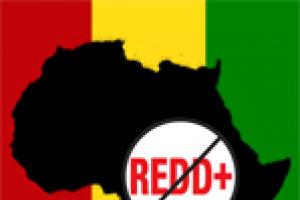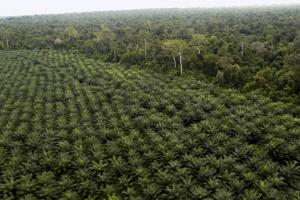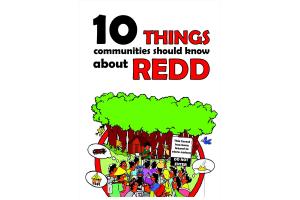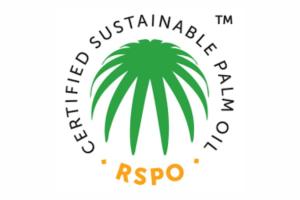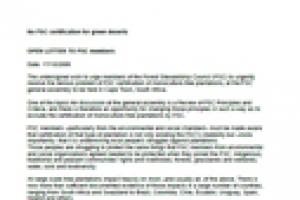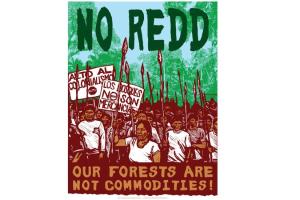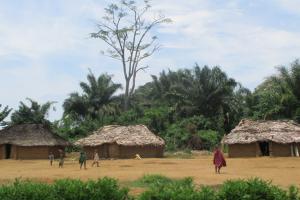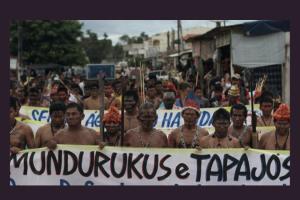“REDD plus or REDD “Light”? Biodiversity, communities and forest carbon certification”, a new report in English by the Swedish Society for Nature Conservation (SSNC), available at http://www.naturskyddsforeningen.se/sites/default/files/dokument-media/REDD%20Plus%20or%20REDD%20Light.pdf
The Green Economy
The Green Economy is a tactic used to “clean up” the image of corporations rather than address corporate capture and capitalism as the true drivers of deforestation. False solutions promoted under the Green Economy include certification, sustainable forest management, ecosystem services, REDD+, the bioeconomy, nature-based climate solutions, and zero net deforestation. Rather than stopping it, these “solutions” support corporate-driven destruction that is causing a deep social and ecological crisis.
Other information
30 March 2013
Other information
29 March 2013
FOR IMMEDIATE RELEASE: March 29, 2013
Contact: NnimmoBassey +216 21003908 nnimmo@eraction.org
Outraged by the rampant land grabs and neocolonialism of REDD (Reducing Emissions from Deforestation and forest degradation), Africans at the World Social Forum in Tunisia took the historic decision to launch the No REDD in Africa Network and join the global movement against REDD.
1 March 2013
On the occasion of March 21st, proclaimed by the UN General Assembly as International Day of the Forests (1), the World Rainforest Movement (WRM) and more than 300 signatories call on the General Assembly and UN Institutions and Initiatives related to forest issues to use the new initiative to address the underlying drivers of deforestation.
Publications
11 January 2013
The main goal of this booklet is to inform communities about the serious problems that a REDD project can cause for the people involved.
Bulletin articles
30 December 2012
At the 18th meeting of the Conference of the Parties to the United Nations Framework Convention on Climate Change, held in Doha, Qatar, negotiations around REDD+ broke down primarily as a result of one issue in particular: how to verify the emission reductions achieved by avoiding deforestation through REDD+ projects.
Bulletin articles
30 December 2012
The certifying body Roundtable on Sustainable Palm Oil (RSPO) has failed to act against a company looking for RSPO’s seal which has bulldozed farmland and forests belonging to the indigenous community of Muara Tae, assisted by the intimidation of armed police brought in to protect the company.
Other information
30 December 2012
“World Summit on Sustainable Forest (-destruction)”, a satirical blog on the summit that will be held on March 5th-6th 2013 in Stockholm (Sweden). You are invited to attend or follow this World Forgery Summit on sustainable forest destruction. Some of the key questions in the agenda:
*Can we find a way to rebrand monoculture plantations as being sustainable?
*Is there a way to make the bankrupt carbon trading system look like a part of the solution to the climate crisis?
Other information
27 December 2012
Only available in Portuguese.
Forum Mudanças Climáticas e Justiça Social, Comissão Epsicopal Pastoral para o Serviço da Caridade, da Justiça e da Paz, Conselho Indigenista Missionário.
Download here the full document in Portuguese.
Bulletin articles
14 December 2012
It is becoming increasingly evident that efforts by governments, NGOs, institutions and corporations to make REDD their principal strategy for reducing deforestation in countries with tropical rainforests are not working. Trees continue to come down at record rates in the name of “development projects” such as mining, industrial palm oil, soy and other crops, hydroelectric power plants and infrastructure for facilitating the displacement of raw materials. Even supposed “sustainable forest management” ends up causing more destruction.
Bulletin articles
14 December 2012
The WRM has produced a new guide of “10 CommunityAlerts about REDD,” intended to provide broad information about REDD. The guide sums updifferent communities’ individual experiences with REDD projects throughout the world, recorded by WRM. The following is a summary of the contents of this new publication, written for a broad audience.
Other information
14 December 2012
The Mundukuru indigenous community in the Brazilian Amazon state of Para decided to cancel a contract that would have allowed the Irish company “Celestial Green Ventures” to sell carbon credits from forests in their territory. The agreement was signed earlier this year giving the Irish company the right over the carbon in forests inside the indigenous territory.
“We are going to cancel the deal. Many in the tribe didn’t want it, so to avoid problems we decided to stop it,” said Candido Waru, leader of a local association of the Munduruku people.
Bulletin articles
14 December 2012
Big NGOs’ support of REDD projects help polluter corporations to greenwash their image.

